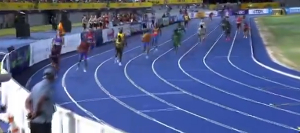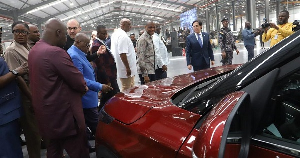General News of Thursday, 2 May 2002
Source: Chronicle
Importer threatens legal action against Customs Service
The Customs Excise and Preventive Service (CEPS) is likely to pay huge, punitive costs should it be dragged to court over the unlawful seizure of some vehicles imported into the country. The importer, Mr Kwabena Amoako Dacosta, has threatened to go to court if CEPS fails to meet his demand.
Dacosta’s three imported vehicles have allegedly been seized unlawfully for reallocation. Solicitor for Dacosta, Mr Kwasi Afrifa, told the Chronicle that unless CEPS refunds all taxes and duties paid on the said vehicle and the importer recovers the cost of the car within seven days, legal action would be instituted against CEPS. Solicitor Afrifa is also demanding other charges from CEPS.
Chronicle has gathered that in the early part of 2001, Dacosta went to Germany and bought three vehicles: Opel Astra, Opel Vectra and an E2200 Mazda bus. He shipped them to Ghana through Amsterdam per Daves Shipping Agency in Tema. The importer/consignee was asked by CEPS to pay ?37 million as duty. Since he could not clear the cars within the 60 days, he applied for an extension of another 60 days, which was duly granted (according to a correspondence signed by one J. Oduro-Firikyi).
The authorisation for the extension followed the imposition of a further ?10 million penalty. The cars were to be cleared from the port before 12 October 2001. Before the importer could take delivery of the said cars, CEPS had allocated them to other people without consulting him.
Dacosta, therefore, petitioned CEPS through his shipping agent. Assistant Commissioner of CEPS, Mr J.K. Oklu, in a memo to the CEPS Commissioner on 25 October 2001 confirmed the authenticity of the petitioner’s claim. Oklu explained that the Mazda bus was allocated in replacement of a Nissan Urvan as part of settlement of a case in which a car allocated to an Assistant Commissioner was withdrawn.
Commissioner Oklu’s explanation came following a letter No. H/IMP/I/SF2 dated 31 July 2001 and signed for the CEPS Commissioner by the Head of Auction, Kwaku Sam-Amoah. The Opel Vectra was also allocated to one K.B. Apenkwa of Koforidua at ?11.3 million on 3 August 2001 while the third of Dacosta’s imported cars, Opel Astra was offered at ?7.5 million to one Pendor Mahmoud of Kumasi.
In view of the developments, Oklu recommended last October that CEPS make efforts to find suitable replacement for the importer. It was further suggested that in lieu of a replacement monies paid by the importer as duties, taxes and penalties should be refunded to him to ease his financial burden.
Six months on, CEPS would not budge hence the intended legal action to recover the cost of the cars and all taxes, duties and penalties. The current open value of the three cars, according to Chronicle survey, is about ?150 million. Opel Astra - ?40 million, Opel Vectra - ?45 million and Mazda - ?65 million.
The above developments can be weighed in the light of a law court that in 1991 granted the reliefs sought by a petitioner in a similar case, Nicole versus CEPS, as reported by the 1992 Ghana Law Report, page 135. CEPS had had to pay ?500,000 as compensation and was ordered to pay ?3,000 per day for the loss of use of a car detained for three months. It also had to pay ?2,424,000 for the unlawful detention of the car. That was 11 years ago.
According to the report, CEPS had detained Nicole’s vehicle from 15 August to October in 1991. She sued for general and exemplary damages. In granting the reliefs sought, the court, presided over by Mr J. Lutterodt, delivered judgement in strong language because CEPS had failed to explain their unlawful conduct.
It was further explained that one of the categories under, which exemplary damages were awarded was where there was oppressive, arbitrary or unconstitutional action by the servants of the government, in this case, CEPS. In Nicole versus CEPS, the defendants had, as in the Dacosta and CEPS encounter, disregarded all laws in connection with the seizure and reallocation. It is believed that after the cars have been allocated for a pittance, CEPS officials collect monies to top up the price of the said cars.












